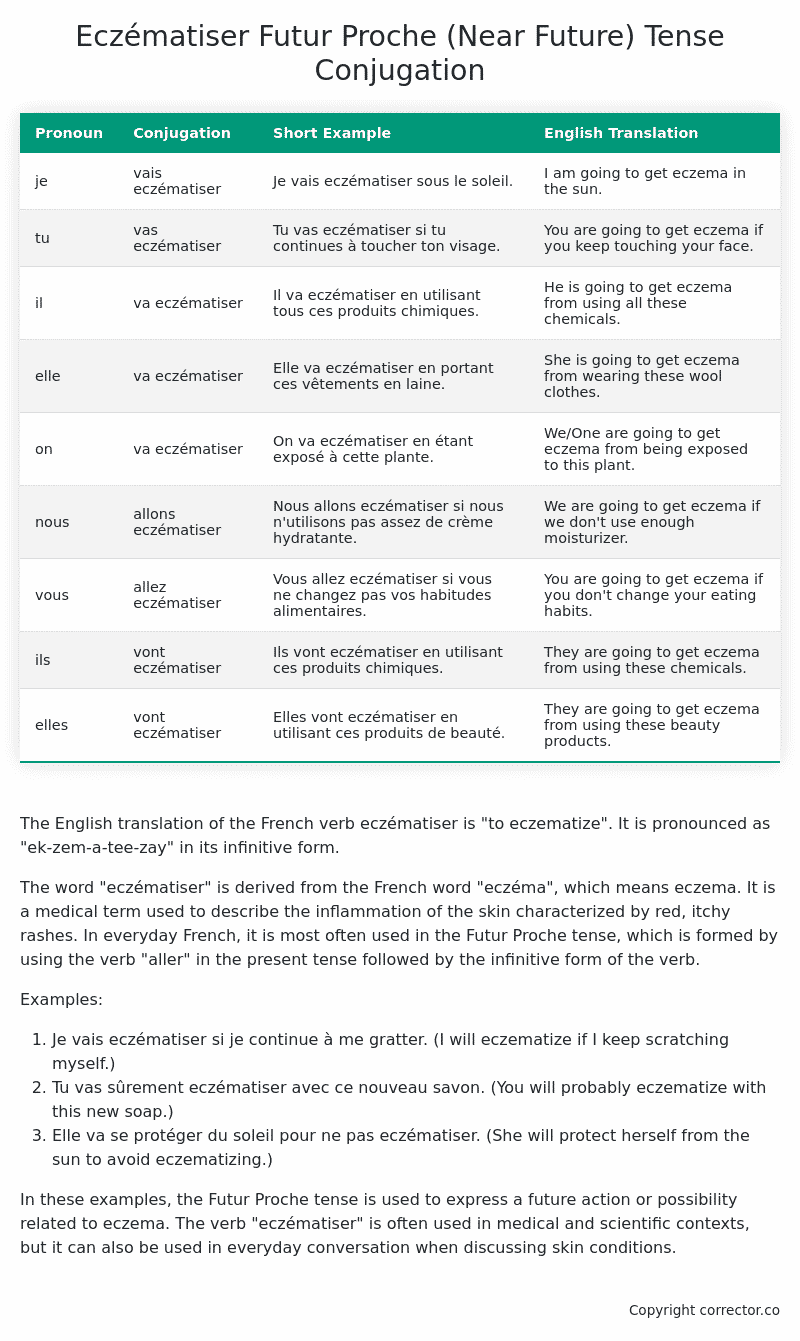Futur Proche (Near Future) Tense Conjugation of the French Verb eczématiser
Introduction to the verb eczématiser
The English translation of the French verb eczématiser is “to eczematize”. It is pronounced as “ek-zem-a-tee-zay” in its infinitive form.
The word “eczématiser” is derived from the French word “eczéma”, which means eczema. It is a medical term used to describe the inflammation of the skin characterized by red, itchy rashes. In everyday French, it is most often used in the Futur Proche tense, which is formed by using the verb “aller” in the present tense followed by the infinitive form of the verb.
Examples:
- Je vais eczématiser si je continue à me gratter. (I will eczematize if I keep scratching myself.)
- Tu vas sûrement eczématiser avec ce nouveau savon. (You will probably eczematize with this new soap.)
- Elle va se protéger du soleil pour ne pas eczématiser. (She will protect herself from the sun to avoid eczematizing.)
In these examples, the Futur Proche tense is used to express a future action or possibility related to eczema. The verb “eczématiser” is often used in medical and scientific contexts, but it can also be used in everyday conversation when discussing skin conditions.
Table of the Futur Proche (Near Future) Tense Conjugation of eczématiser
| Pronoun | Conjugation | Short Example | English Translation |
|---|---|---|---|
| je | vais eczématiser | Je vais eczématiser sous le soleil. | I am going to get eczema in the sun. |
| tu | vas eczématiser | Tu vas eczématiser si tu continues à toucher ton visage. | You are going to get eczema if you keep touching your face. |
| il | va eczématiser | Il va eczématiser en utilisant tous ces produits chimiques. | He is going to get eczema from using all these chemicals. |
| elle | va eczématiser | Elle va eczématiser en portant ces vêtements en laine. | She is going to get eczema from wearing these wool clothes. |
| on | va eczématiser | On va eczématiser en étant exposé à cette plante. | We/One are going to get eczema from being exposed to this plant. |
| nous | allons eczématiser | Nous allons eczématiser si nous n’utilisons pas assez de crème hydratante. | We are going to get eczema if we don’t use enough moisturizer. |
| vous | allez eczématiser | Vous allez eczématiser si vous ne changez pas vos habitudes alimentaires. | You are going to get eczema if you don’t change your eating habits. |
| ils | vont eczématiser | Ils vont eczématiser en utilisant ces produits chimiques. | They are going to get eczema from using these chemicals. |
| elles | vont eczématiser | Elles vont eczématiser en utilisant ces produits de beauté. | They are going to get eczema from using these beauty products. |
Other Conjugations for Eczématiser.
Le Present (Present Tense) Conjugation of the French Verb eczématiser
Imparfait (Imperfect) Tense Conjugation of the French Verb eczématiser
Passé Simple (Simple Past) Tense Conjugation of the French Verb eczématiser
Passé Composé (Present Perfect) Tense Conjugation of the French Verb eczématiser
Futur Simple (Simple Future) Tense Conjugation of the French Verb eczématiser
Futur Proche (Near Future) Tense Conjugation of the French Verb eczématiser (this article)
Plus-que-parfait (Pluperfect) Tense Conjugation of the French Verb eczématiser
Passé Antérieur (Past Anterior) Tense Conjugation of the French Verb eczématiser
Futur Antérieur (Future Anterior) Tense Conjugation of the French Verb eczématiser
Subjonctif Présent (Subjunctive Present) Tense Conjugation of the French Verb eczématiser
Subjonctif Passé (Subjunctive Past) Tense Conjugation of the French Verb eczématiser
Subjonctif Imparfait (Subjunctive Imperfect) Tense Conjugation of the French Verb eczématiser
Conditionnel Présent (Conditional Present) Tense Conjugation of the French Verb eczématiser
Conditionnel Passé (Conditional Past) Tense Conjugation of the French Verb eczématiser
L’impératif Présent (Imperative Present) Tense Conjugation of the French Verb eczématiser
L’infinitif Présent (Infinitive Present) Tense Conjugation of the French Verb eczématiser
Struggling with French verbs or the language in general? Why not use our free French Grammar Checker – no registration required!
Get a FREE Download Study Sheet of this Conjugation 🔥
Simply right click the image below, click “save image” and get your free reference for the eczématiser Futur Proche tense conjugation!

Eczématiser – About the French Futur Proche (Near Future) Tense
Formation
1. Conjugate “aller” in the present tense according to the subject pronoun:
2. Add the infinitive of the main verb immediately after “aller.” For example:
Common Everyday Usage
Interactions with Other Tenses
Present Tense
Past Tense
Conditional Tense
Summary
I hope you enjoyed this article on the verb eczématiser. Still in a learning mood? Check out another TOTALLY random French verb conjugation!


